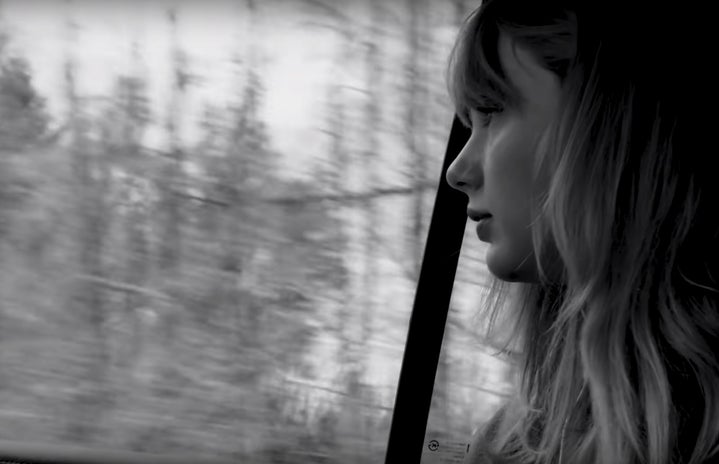As this semester comes to a close, I have thought long and hard about the trying times that we have had to live through as college students. Going to school during the pandemic and feeling firsthand the repercussions of social distancing and online classes, we are forced to live our lives to a fraction of what they are supposed to be. When the reality of the pandemic becomes overwhelming I tend to turn to music. One of the albums that I resonated with was Taylor Swift’s Folklore. Having been released during the height of the pandemic, this album addresses the loneliness and separation that people around the world are experiencing. When I found out that Taylor Swift released a documentary playing this album for the first time in the same room with her collaborators, I knew I had to check it out. Since Taylor never had the chance to perform this album for a live audience, this was the next best thing.
Folklore: The Long Pond Studio Sessions is a live performance of Taylor Swift’s most recent album with appearances from her collaborators Aaron Dessner and Jack Antonoff. During this cozy and soothing rendition of Folklore, Swift pauses to describe the meaning behind certain songs, where she came up with her ideas and detailing the importance that this album is for both herself and her audience. Here’s what I learned from this documentary.
In the credits of Folklore, an unknown writer named William Bowery was credited on both “Exile” and “Betty.” Many people had speculated who this mystery person would be, but in the documentary Swift reveals William Bowery as her long-term boyfriend Joe Alwyn. Having never collaborated with a significant other on a song before, Swift was hesitant – yet excited – to try something different during trying times. After all, it ended up working out perfectly, ending up with two songs that fit perfectly into the album.
Taylor Swift discusses the meaning behind her song “Mirrorball” later in the documentary. Still reeling from the sudden impact of the pandemic, Swift wrote this song in response to finding out all of her Lover Fest shows had been canceled. Knowing that she should take a break from work life everyone else around her, Swift still found herself furiously writing songs to fill the void of normal everyday life. She felt as if she couldn’t sit still, knowing that there was so much to address when it came to the pandemic.
One of the most interesting aspects of Folklore is that the album is not completely autobiographical. In songs such as “The Last Great American Dynasty,” “Betty,” “Cardigan,” and “August,” Swift weaves in a variety of stories that don’t come from her own experiences and allow the album to exist on its own. Three of the songs showcase three different sides to a love triangle from different points of view from Betty (“Cardigan”), James (“Betty”), and the unnamed character from “August.”
As the fireside chats continued, Swift described how the first song she wrote for the album was “My Tears Ricochet.” When it comes to a Taylor Swift album, track five on any album is closely related to heartbreak. Swift details how she knew from the beginning that this song was going to be track five due to Swift believing it to be one of the saddest songs on the album. Antonoff praised Swift by coining “My Tears Ricochet” as one of the best songs that she has ever written.
This album is very special to me because it addresses the sadness, heartbreak, and loss that comes not only with the pandemic but with life in general. It highlights the ugly parts of our lives that we don’t want to think about, but once we do it can tend to become too much. This album is a way to understand that it is ok to not be ok all of the time and it is the perfect album to listen to in these troubling times. During the COVID-19 pandemic, there has been less and less events and activities to be excited for. That’s what made the release of this album so exciting to me because after everything we have been through there is still the presence of art – providing hope for better times ahead.


